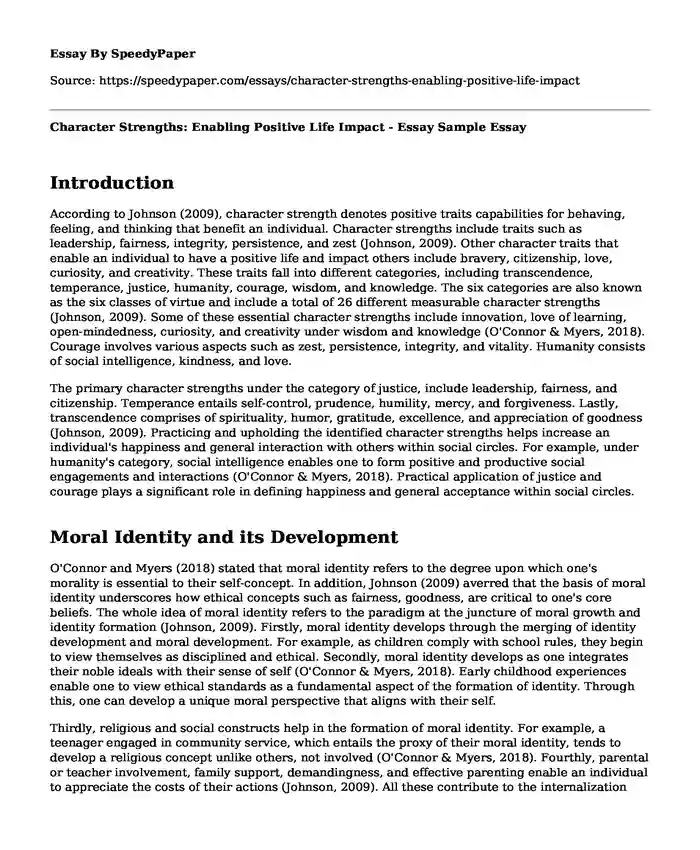
| Type of paper: | Essay |
| Categories: | Leadership analysis Literature Ethics |
| Pages: | 3 |
| Wordcount: | 655 words |
Introduction
According to Johnson (2009), character strength denotes positive traits capabilities for behaving, feeling, and thinking that benefit an individual. Character strengths include traits such as leadership, fairness, integrity, persistence, and zest (Johnson, 2009). Other character traits that enable an individual to have a positive life and impact others include bravery, citizenship, love, curiosity, and creativity. These traits fall into different categories, including transcendence, temperance, justice, humanity, courage, wisdom, and knowledge. The six categories are also known as the six classes of virtue and include a total of 26 different measurable character strengths (Johnson, 2009). Some of these essential character strengths include innovation, love of learning, open-mindedness, curiosity, and creativity under wisdom and knowledge (O'Connor & Myers, 2018). Courage involves various aspects such as zest, persistence, integrity, and vitality. Humanity consists of social intelligence, kindness, and love.
The primary character strengths under the category of justice, include leadership, fairness, and citizenship. Temperance entails self-control, prudence, humility, mercy, and forgiveness. Lastly, transcendence comprises of spirituality, humor, gratitude, excellence, and appreciation of goodness (Johnson, 2009). Practicing and upholding the identified character strengths helps increase an individual's happiness and general interaction with others within social circles. For example, under humanity's category, social intelligence enables one to form positive and productive social engagements and interactions (O'Connor & Myers, 2018). Practical application of justice and courage plays a significant role in defining happiness and general acceptance within social circles.
Moral Identity and its Development
O'Connor and Myers (2018) stated that moral identity refers to the degree upon which one's morality is essential to their self-concept. In addition, Johnson (2009) averred that the basis of moral identity underscores how ethical concepts such as fairness, goodness, are critical to one's core beliefs. The whole idea of moral identity refers to the paradigm at the juncture of moral growth and identity formation (Johnson, 2009). Firstly, moral identity develops through the merging of identity development and moral development. For example, as children comply with school rules, they begin to view themselves as disciplined and ethical. Secondly, moral identity develops as one integrates their noble ideals with their sense of self (O'Connor & Myers, 2018). Early childhood experiences enable one to view ethical standards as a fundamental aspect of the formation of identity. Through this, one can develop a unique moral perspective that aligns with their self.
Thirdly, religious and social constructs help in the formation of moral identity. For example, a teenager engaged in community service, which entails the proxy of their moral identity, tends to develop a religious concept unlike others, not involved (O'Connor & Myers, 2018). Fourthly, parental or teacher involvement, family support, demandingness, and effective parenting enable an individual to appreciate the costs of their actions (Johnson, 2009). All these contribute to the internalization and realization of moral values. Lastly, parental warmth also helps in the general understanding of basic constructs of moral values and ideals in an individual.
Personal Mission Statement on Becoming an Ethical Leader
My personal mission statement on becoming an ethical leader is: "To serve as an example to others, a lamp, roadmap, and guide to others and integrate ethical values to making a difference in the world." The personal mission statement remains an essential mark in my journey to making a significant difference in the world through people. The statement will provide me with the necessary constructs to maintain a strong personal appeal, self-esteem, and moral well-being. The most important aspect of my journey towards making a difference entails nurturing my spiritual, physical, mental, and academic foundations. I believe that these will enable me to make a significant difference in my life and others' well-being.
References
Johnson, C. E. (2009). Meeting the ethical challenges of leadership: Casting light or shadow. Los Angeles: SAGE.
O'Connor, D., & Myers, J. (2018). Ignatian values in business and accounting education: Towards the formation of ethical leadership. Journal of Business and Educational Leadership, 7(1), 124-136. http://asbbs.org/files/2018/JBEL7.1.pdf#page=124
Cite this page
Character Strengths: Enabling Positive Life Impact - Essay Sample. (2023, Oct 13). Retrieved from https://speedypaper.com/essays/character-strengths-enabling-positive-life-impact
Request Removal
If you are the original author of this essay and no longer wish to have it published on the SpeedyPaper website, please click below to request its removal:
- Free Essay on Oscar Wilde Aesthetic
- The Miller's Tale Rewritten as a Modern Essay Example
- Literary Essay Sample: Use of Metaphors in Emily Dickinson's Poem
- Essay Sample Dedicated to Evaluating Peer-Reviewed Resources
- Free Essay. Development History of Foxconn Company
- Essay Sample on Comparison Between Christianity and Islam
- Paper Example on Echoes of Freedom: Maya Angelou and Frederick Douglass on Slavery's Legacy
Popular categories




